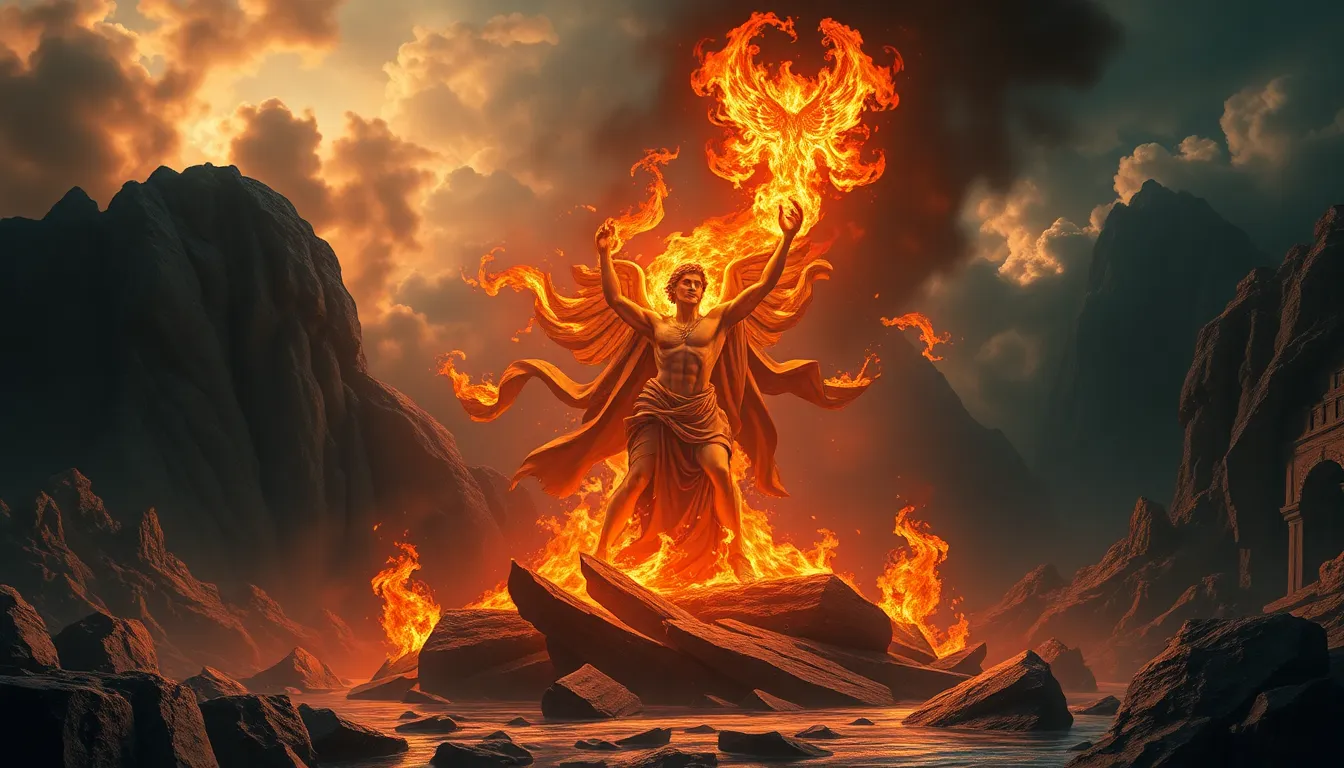The Fire of Prometheus: More Than Just a Gift to Humanity
I. Introduction
The myth of Prometheus is one of the most profound stories in Greek mythology, encapsulating themes of rebellion, sacrifice, and the quest for knowledge. Prometheus, a Titan, is famously known for stealing fire from the gods and giving it to humanity, an act that symbolizes not just the gift of warmth and light, but also the spark of intellectual and cultural advancement.
Fire holds significant importance in mythology and human development; it has been a catalyst for civilization, enabling progress in various domains such as technology, art, and social structures. This article aims to explore the deeper meanings of Prometheus’ gift, analyzing the myth’s implications on knowledge, innovation, and ethical responsibility.
II. The Myth of Prometheus
The myth of Prometheus unfolds with key characters: Prometheus himself, his brother Epimetheus, and Zeus, the king of the gods. Prometheus was tasked with creating humanity and, seeing their vulnerability, decided to grant them fire to empower and enlighten them. This act of defiance against Zeus, who withheld fire from humans, sets the stage for the central conflict of the myth.
Prometheus emerges as a symbol of rebellion against divine authority, embodying the spirit of innovation and the desire to uplift humanity. However, this act of rebellion came at a grave cost. Zeus, enraged by Prometheus’ disobedience, punished him severely by having him bound to a rock, where an eagle would eat his liver daily—a liver that would regenerate each night, ensuring his eternal suffering. This punishment reflects the weight of sacrifice involved in the pursuit of knowledge and the consequences of defying the gods.
III. Fire as a Metaphor for Knowledge and Enlightenment
Fire serves as a powerful metaphor for intellectual awakening and enlightenment. It symbolizes the illumination of the mind and the drive to explore the unknown. The act of bringing fire to humanity did not merely provide a physical asset; it ignited the flames of curiosity and the pursuit of knowledge.
- Advancement of Civilization: Fire has been central to human development, facilitating cooking, protection, and the creation of tools. Each of these advancements has propelled societies forward.
- Connections to Knowledge: The metaphor of fire extends to the realms of science, philosophy, and the arts, where the quest for understanding has always been fueled by a desire to ‘light the way’ through the darkness of ignorance.
IV. The Duality of Fire: Creation and Destruction
Fire embodies a dual nature, representing both innovation and devastation. While it has been a source of creativity and advancement, it also possesses the potential for destruction.
Historical examples illustrate this duality:
- Innovation: The industrial revolution, powered by advancements in fire and energy, led to unprecedented progress in technology and infrastructure.
- Catastrophe: Conversely, uncontrolled fires, such as those seen in wildfires or urban conflagrations, have resulted in significant loss of life and property.
Thus, the balance between harnessing fire and respecting its power becomes crucial. Humanity must learn to wield fire responsibly, understanding that with great power comes great responsibility.
V. Prometheus in Modern Culture
Prometheus continues to be a powerful figure in modern culture, appearing in various forms of literature, art, and popular media. From Mary Shelley’s “Frankenstein,” which explores themes of creation and hubris, to contemporary films and artworks that reinterpret the myth, Prometheus symbolizes human aspiration and the quest for knowledge.
The relevance of Prometheus’ story resonates in contemporary society, serving as a reminder of the potential consequences of unchecked ambition. The Titan’s defiance against the gods reflects our own struggles against limitations, whether imposed by society, nature, or even ourselves.
VI. Ethical Implications of Prometheus’ Gift
The gift of fire also raises significant ethical implications. Fire, as a tool, can be wielded for both good and evil. This duality prompts moral lessons regarding responsibility and stewardship.
In today’s world, we face modern parallels where the pursuit of technological advancements mirrors Prometheus’ actions:
- Positive Uses: Technology can foster global communication, improve healthcare, and address environmental challenges.
- Negative Consequences: Conversely, the same technologies can be used for warfare, surveillance, and environmental degradation.
Thus, the myth of Prometheus urges us to reflect on our responsibilities as we navigate the ethical dilemmas posed by modern advancements.
VII. Lessons from Prometheus for Today’s World
The lessons derived from Prometheus are particularly relevant as we face global challenges such as climate change, social inequality, and technological disruption. Innovation is essential in addressing these issues, but it must be approached with caution.
Cautionary tales abound regarding overreach, reminding us of the need for ethical considerations in our pursuits:
- Responsible Innovation: We must prioritize sustainability and equity in our technological advancements.
- Balancing Progress and Ethics: The myth of Prometheus inspires us to strive for progress while remaining aware of the potential consequences of our actions.
VIII. Conclusion
In summary, the myth of Prometheus serves as a powerful reminder of the complexities surrounding human advancement. The themes of rebellion, the pursuit of knowledge, and the ethical implications of our actions resonate deeply in today’s world. As we continue to navigate the balance between gift and burden, may we remember the enduring legacy of Prometheus and the significance of fire—not just as a source of light and warmth, but as a symbol of our collective journey toward enlightenment and responsibility.




